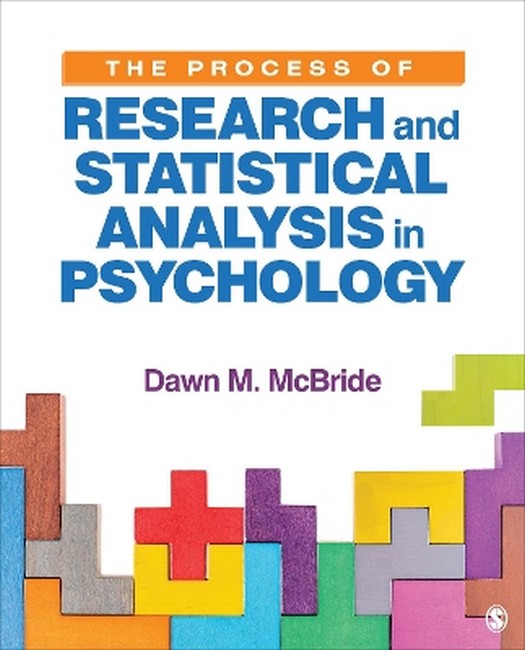Dawn M. McBride is professor of psychology at Illinois State University, where she has taught research methods since 1998. Her research interests include automatic forms of memory, false memory, prospective memory, task order choices, and forgetting. In addition to research methods, she teaches courses in introductory psychology, cognition and learning, and human memory; she also teaches a graduate course in experimental design. She is a recipient of the Illinois State University Teaching Initiative Award and the Illinois State University SPA/Psi Chi Jim Johnson Award for commitment to undergraduate mentorship, involvement, and achievement. Her nonacademic interests include spending time with her family, traveling, watching Philadelphia sports teams (it was a good year for Philly sports this year!), and reading British murder mysteries. She earned her PhD in cognitive psychology from the University of California, Irvine, and her BA from the University of California, Los Angeles.
Request Academic Copy
Please copy the ISBN for submitting review copy form
Description
Preface Acknowledgments About the Author Chapter 1 * Psychological Research: The Whys and Hows of the Scientific Method and Data Why Should I Care About Research If I Don't Want to Do Research in My Career? Why Psychologists Conduct Research Populations and Samples Types of Data Frequency Distributions Summary of Frequency Distributions Chapter Summary Applying Your Knowledge Test Yourself Chapter 2 * Developing a Research Question and Understanding Research Reports: Where Research Questions Come From Developing a Research Question How to Conduct a Literature Review What You Find in a Literature Review Using the Literature Review to Make Hypotheses APA-Style Article Writing Oral Presentations Poster Presentations Chapter Summary Applying Your Knowledge Test Yourself Chapter 3 * Ethical Guidelines for Psychological Research Historical Context for Ethical Guidelines Current Ethical Guidelines for Human Participants Research Institutional Review Boards Ethics in Reporting Research Chapter Summary Applying Your Knowledge Test Yourself Chapter 4 * Probability and Sampling Probability Concepts Sampling Techniques Distribution of Sample Means Introduction Recruiting Participants Using the Internet to Sample Chapter Summary Applying Your Knowledge Test Yourself Chapter 5 * How Psychologists Use the Scientific Method: Data Collection Techniques and Research Designs Data Collection Techniques Types of Research Designs Chapter Summary Applying Your Knowledge Test Yourself Chapter 6 * Descriptive Statistics Central Tendency in Distributions Mean Median Mode Which Measure of Central Tendency Should I Use? Variability in Distributions Standard Deviation Descriptive Statistics in Graphs APA Style for Graphs and Tables Chapter Summary Test Yourself Chapter 7 * Independent Variables and Validity in Research Independent Variables Validity and Sources of Bias Chapter Summary Applying Your Knowledge Test Yourself Chapter 8 * One-Factor Experiments Manipulation of Independent Variables Control in Within-Subjects and Between-Subjects Experiments Experiment Examples Chapter Summary Applying Your Knowledge Test Yourself Chapter 9 * Hypothesis-Testing Logic The z Score Transformation The Normal Distribution Using the Normal Distribution to Determine the Probability of a Sample Mean Using the Normal Distribution to Test Hypotheses Logic of Hypothesis Testing Types of Hypothesis-Testing Errors Statistical Significance Chapter Summary Test Yourself Chapter 10 * t Tests The t Distribution One-Sample t Test Conducting a One-Sample t Test Using SPSS One-Sample t Test Assumptions Samples With Related or Paired Data Calculating a Related or Paired Samples t Test Conducting a Related or Paired Samples t Test Using SPSS Paired Samples t Test Assumptions Independent Samples Calculating the Independent Samples t Test Conducting an Independent Samples t Test Using SPSS Independent Samples t Test Assumptions Chapter Summary Test Yourself Chapter 11 * One-Way Analysis of Variance More Than Two Independent Samples Calculating the F Score in an Analysis of Variance Conducting a One-Way Between-Subjects Analysis of Variance Using SPSS Test Assumptions Chapter Summary Test Yourself Chapter 12 * Correlation Tests and Simple Linear Regression Correlation Versus Causation Hypothesis Testing With Pearson r Conducting a Pearson r Test Using SPSS Regression Analyses Nonlinear Relationships Chapter Summary Test Yourself Chapter 13 * Chi-Square Tests Parametric Versus Nonparametric Tests Observed Versus Expected Frequencies Calculating a Chi-Square by Hand Calculating a Chi-Square Test Using SPSS Chapter Summary Test Yourself Chapter 14 * Multifactor Experiments Factorial Designs More About Interactions Experiment Examples Chapter Summary Applying Your Knowledge Test Yourself Chapter 15 * Two-Way Analysis of Variance Factorial Designs Calculating a Two-Way Analysis of Variance Calculating Two-Way Between-Subjects Analysis of Variance Using SPSS Test Assumptions Chapter Summary Test Yourself Chapter 16 * One-Way Within-Subjects Analysis of Variance Within-Subjects Designs Calculating a Within-Subjects Analysis of Variance Calculating One-Way Within-Subjects Analysis of Variance Using SPSS Test Assumptions More Complex Within-Subjects Designs Chapter Summary Test Yourself Appendix A: Sample APA-Style Research Report Appendix B: Answers to Stop and Think Questions Appendix C: Unit Normal Table (z Table) Appendix D: t Distribution Table Appendix E: F Distribution Table Appendix F: Pearson r Critical Values Table Appendix G: Chi Square Critical Values Table Glossary References Index
"This text provides an introduction to the entire research process from the development of the research question to the analysis of data. There is a stepwise, methodical approach to each aspect of research design and analysis, which undergraduate students are likely to find approachable." -- Emily Coyle

